Diplomatic Bluebook 2015
Chapter 4
Japan’s Diplomacy Open to the Public
2.Enhancing Foreign Policy Implementation Structure
In order to respond to the increasingly severe security environment and diversifying diplomatic issues, it is necessary to dramatically enhance the foreign policy implementation structure, which is still less sufficient than that of other major countries. In view of this, MOFA is devoted to enhancing its foreign policy implementation structure by reforming the personnel structure and diplomatic missions overseas, such as Embassies and Consulate-Generals.
Diplomatic missions overseas, such as Embassies and Consulate-Generals, not only represent Japan but also play a key role in diplomatic areas, such as information gathering on the diplomatic frontline, provision of information to the public overseas, promotion of diplomatic relations, and international contribution. At the same time, they are responsible for operations directly related to the improvement of benefits for Japanese nationals, such as protecting their lives and safety, providing support for Japanese companies, promoting investment and tourism, and securing energy and other resources.
In January 2015, Japanese Embassies were established in the Marshall Islands, Armenia and Namibia. The establishment of Embassies in these three countries is significant in terms of the following viewpoints. Cooperation with the Marshall Islands in various aspects, such as recovery of the remains of Japan’s war dead, is becoming even more important in addition to the country’s importance as a supply source of marine products and its sea lane location that is vital for Japan. Armenia has an important role in the stability of the Caucasus and there is a high potential for stronger ties with Japan in various areas, including economic ties, since the country has recently been focusing on the development of its IT industry. Namibia is endowed with rich marine, mineral resources and the location that can become the logistics gateway to the Atlantic Ocean of southern Africa area. With these advantages as a background, the country expects expansion of trade and investment with Japan, especially in the resource development and energy fields, and Namibia is growing its importance in supporting Japanese companies and protecting Japanese nationals overseas. Diplomatic missions overseas of major countries have already acted in Namibia, and Japan needs to launch more active diplomatic operations through strengthening information gathering and further deepening the relationship with Government of Namibia.
As of FY2014, the number of Japanese diplomatic missions overseas is 207 (139 Embassies, 60 Consulate-Generals and 8 Permanent missions) and the number is still fewer than that of other major countries such as US (277) and China (254).
In FY2015, Japan will establish Embassies in the Maldives, the Solomon Islands, Barbados, Tajikistan, Turkmenistan and Moldova for the following reasons, based on the idea that it is essential to further strengthen the foreign policy implementation structure to a level equivalent to other major countries.
As for the Maldives, 40,000 Japanese people visit the country every year. As located on the Indian Ocean sea lane, it has geo-political importance. The Maldives is friendly to Japan, providing consistent support in the international arena.
Next, the Solomon Islands are bestowed with marine resources such as tuna and mineral resources. In addition, it is necessary for Japan to further strengthen the implementation structure for projects to recover the remains of the Japanese war dead and to commemorate them.
Barbados is located at on important hub of regional transportation in the East Caribbean area. It is also important for Japan for the purpose of further strengthening relations with major countries of the Caribbean Community (CARICOM), which possess an influence, and have a similar stance with Japan in the international arena.
Tajikistan has a long border with Afghanistan, and thus the country is important in terms of anti-terrorist and anti-drug measures, as well as in contributing to the stability of the entirety of Central Asia. Japan has friendly relations with Tajikistan, a trustworthy country in the international arena.
Turkmenistan is a resource-rich country with the world’s fourth-largest reserves of natural gas. Japanese companies participate in a development project with a total investment of 1 trillion yen. It is also important for regional stability since the country shares borders with Afghanistan and Iran.
Finally, Moldova is located at a point of strategic importance between the EU and Russia, and has been working on democratization and market-oriented economic reform. The country is also important from the perspective of keeping a close watch on the situation in Ukraine.
Since the need for supporting Japanese companies is increasing rapidly and provision of information to the public overseas in other cities in addition to capitals is needed, Japan will establish Consulate-Generals in León, Mexico and Hamburg, Germany. In León, the number of Japanese nationals and companies has been rapidly increasing in recent years. In Hamburg, the International Tribunal for the Law of the Sea has its seat. The Tribunal’s importance for the settlement of maritime disputes by peaceful means is increasing in recent years. Also, some of Germany’s prominent media companies have their headquarters in Hamburg.
As for the number of staff members, given the government’s policy to reduce the overall personnel expenses in the light of the current severe budget situations, MOFA set the number of staff members to be 5,787 with an increase of 34 staffs in FY2014, in consideration of the importance of strengthening the organizational structure to implement foreign policy and as a preparation for the scheduled establishment of the National Security Secretariat of Japan. However, this number is still insufficient when compared to that of other major countries. MOFA is therefore continuing to improve its personnel structure, with a view to building a more effective and efficient system. In the meantime, based on the understanding that enhancing the foreign policy implementation structure remain necessary in FY2015, MOFA plans to increase its staff members by 82 persons in order to address important issues such as implementation of Japan’s foreign policy that takes a panoramic perspective of the world map and the policy of “Proactive Contribution to Peace,” strengthening its capacity to transmit information and enhancing the organizational structure to implement public relations activities, promoting economic diplomacy and supporting the overseas activities of Japanese nationals.
In order to support the foreign policy implementation structure of Japan and to (1) ensure/improve national interests reflecting the changes in the strategic environment of the Asia-Pacific region and (2) realize the “Promotion of Global Interests” through contributions to global issues, under a fluid international situation, MOFA appropriated a budget of 666.1 billion yen for FY2014 (an increase of 9.5% from FY2013). The total amount of the FY2014 supplementary budget was 190.5 billion yen. The supplementary budget included the total amount of 159.9 billion yen allocated as additional financial demand for emergency humanitarian/reconstruction assistance, including measures against the Ebola virus disease and support for the stabilization of the Middle East, North Africa and Europe. It also included the sum of 30.5 billion yen allocated to revitalization support for SMEs using ODA and revitalization of local economy as economic measures. The FY2015 initial government budget proposal appropriated 685.4 billion yen (an increase of 2.9% from FY2014) in order to strongly promote “Japan’s Foreign Policy that Takes a Panoramic Perspective of the World Map” under the policy of “Proactive Contribution to Peace” based on the principle of international cooperation by identifying the following five priorities: (1) strategic public diplomacy, (2) contribution to global issues based on the policy of “Proactive Contribution to Peace,” (3) promotion of economic diplomacy to boost “Abenomics,” (4) proactive/strategic use of ODA, and (5) dramatic expansion of the foreign policy implementation structure.
In order to promote the Japan’s national interests, it is essential to strengthen the foreign policy implementation structure. We will strategically continue to proceed enhancement of foreign policy implementation structure, so that it will be equivalent to that of other major countries, while further streamline the structure itself.
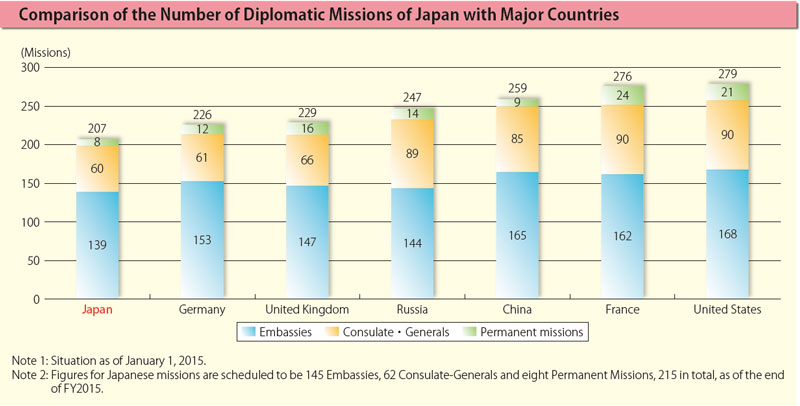
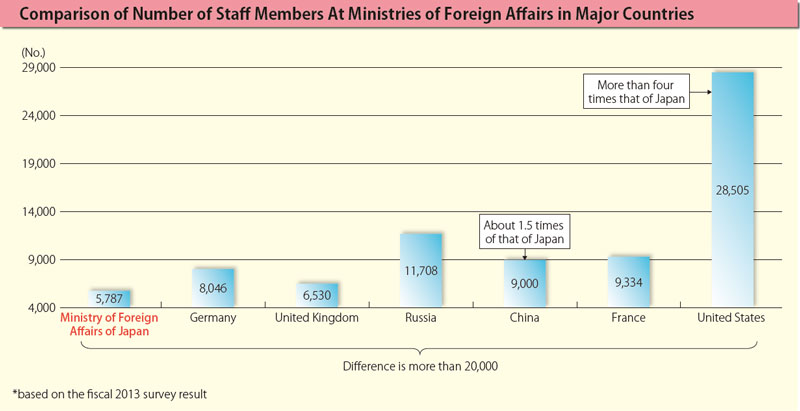
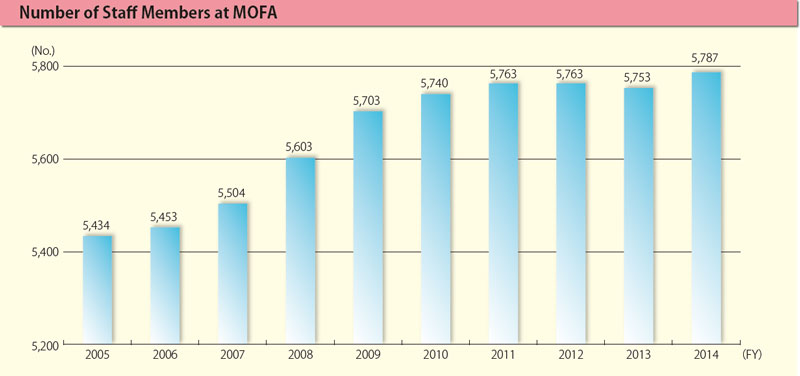
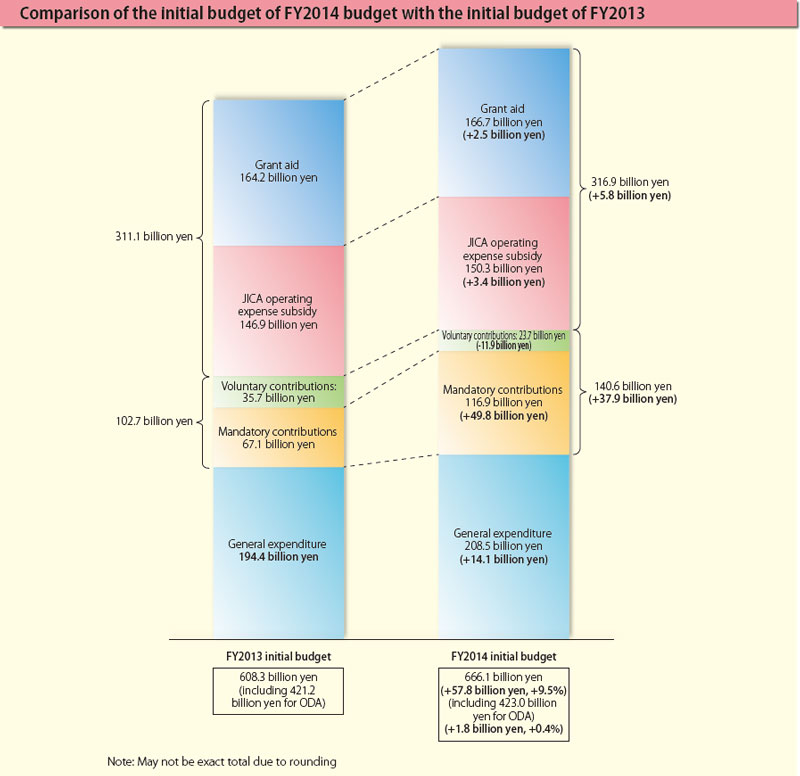
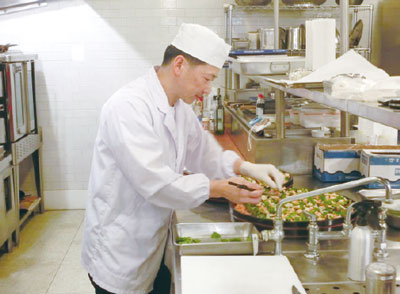 Preparing the banquet (UN Ambassador’s offficial residence kitchen)
Preparing the banquet (UN Ambassador’s offficial residence kitchen)
I am asked frequently what the job of an official residence chef is like. In a word, the task is to serve meals at banquets held at the Ambassador’s official residence, but daily life holds plenty of variety that can’t be easily summed up.
I have worked as an official residence chef for Ambassador or Consul General in Thailand, Italy, India and San Francisco (United States) and at this moment serve as Head Chef of the official residence of Ambassador Yoshikawa of Permanent Representative of Japan to the United Nations in New York. The guests have different tastes in food at each place, and ways of procurement of food ingredients also vary significantly. At my present workplace, the guests Ambassador Yoshikawa hosts range from over nearly 200 UN member states. As their cultural backgrounds and eating habits vary greatly, I often face unexpected dietary restrictions. Even though New York has fewer problems with availability of ingredients in general, compared with Japan, I still struggle to find some things—being a chef specialized in Japanese cuisine. I also take special care to keep the daily menu healthy, as fine dining tends to be high in calories.
Throughout my career I have served my meals to the Imperial House and successive Prime Ministers of Japan and foreign guests such as Princess Sirindhorn of Thailand, Norodom Ranariddh, President of the National Assembly of Cambodia and Ban Ki-moon, Secretary-General of the United Nations. I serve elaborately prepared meals every time and I feel happy and fulfilled to hear positive feedback from the guests when they tell me that the meal was good.
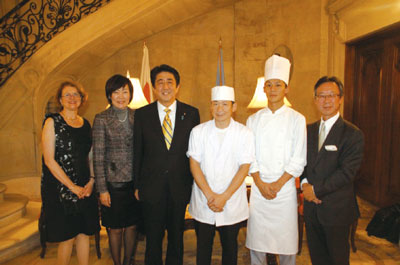 Head Chef Murakami (center) with Prime Minister Abe, Ambassador Yoshikawa and their wives (September 24, Official residence of UN Ambassador)
Head Chef Murakami (center) with Prime Minister Abe, Ambassador Yoshikawa and their wives (September 24, Official residence of UN Ambassador)
The local cuisine of the country at each of my posts also inspires me to create new dishes. Tasting authentic local cuisine in its local region is an especially great pleasure, since every chef generally has a professional interest in eating. Such experience also provides great opportunities to learn. I do not have any concrete plans after my present post as Head Chef at Ambassador Yoshikawa’s official residence, but I will continue my career relating to food. I am convinced that my international experience in foreign countries will be of great help to me.
Atsushige Murakami,
Head Chef of Official Residence,
Permanent Representative of Japan to the United Nations

